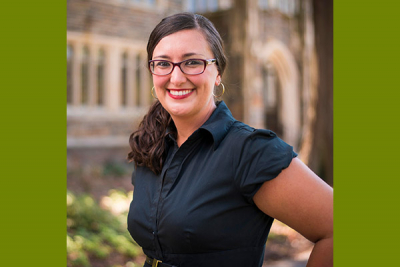Duke Today

Ishika Gupta didn’t know anyone when she arrived at Duke as a first-year student. So, when she learned that the university had a mandatory random roommate policy for incoming first-year students, she saw it as an opportunity to meet new people from different backgrounds.
“One of the reasons why I loved it is that my roommate was an engineering student, so there was no reason for us to ever meet at Duke except because of the random policy. I feel that because of it I got to meet her,” said Gupta, who at the time was a pre-med student. Today, she is a research tech in the White-McGarrah Lab in Duke’s Molecular Physiology Institute.
The policy, launched in 2018 with the goal of giving students more chances to meet others from various backgrounds, became the subject of a study conducted by Sarah Gaither, Nicholas J. and Theresa M. Leonardy Associate Professor of psychology and neuroscience. The findings, recently published in the Journal of Personality and Social Psychology, suggest that the randomized roommate assignment is a promising way for universities to promote cross-race contact and increase diversity in friend networks.
Gaither started researching random roommate policies while a graduate student at Tufts University, where she earned her Ph.D. in social psychology. Her interest lies in her experience growing up in a mixed-race household.
Gaither’s research at Tufts invited white students who lived with someone from a different racial background to the lab to meet a Black individual they had never met before. The work showed that these interactions went much more positively for both students when the white student had lived with someone from a different race.
You can learn from your roommate and see what their interests are, and maybe you’ll learn something about yourself.
Ishika Gupta
When Duke’s random roommate policy was instituted, not everyone was sold on the idea. Some students pushed back. That prompted Duke to reach out to Gaither.
“Since they knew I had done that work as a grad student, as they were deciding on the policy change, they reached out to me to ask if I would like to work with Duke and try to assess data points behind the policy change,” Gaither said.
As a postdoctoral researcher in Gaither’s lab, Analia Albuja, Ph.D., now an assistant professor of psychology at Northeastern University, broke the analysis into three parts: The first part used university survey data from students before the random roommate policy took effect. At that time, about 50 percent of students chose to be randomly assigned. The second group of students was surveyed after the policy was put into place. That resulted in a significant increase in the likelihood of students being assigned to someone from another racial group.
The third study was a subset of the initial two groups in which students were asked to interact with someone from a different racial background (not their roommate) to once again see if the experience of living with someone from another racial background would reduce anxiety in this future cross-race interaction.

“On average, we found that the experience of living with someone from a different background caused an increase in positivity in a future diverse setting,” Gaither said.
The recently published study echoes the results of her earlier research: “Randomized roommate assignment is a promising avenue for universities to promote cross-race contact amidst persistent racial segregation on college campuses, with limited negative consequences for relationship quality,” the paper states.
Mary Pat McMahon, Duke’s vice provost and vice president of student affairs, knew Gaither from Tufts, where she served as dean of student affairs at its Schools of Arts and Sciences and Engineering, and was familiar with her research.
McMahon said even though roommates are randomly assigned for incoming first-year Duke students, common interests and personal preferences are taken into consideration, but not racial diversity.
“In our residential community at Duke, students engage with this much more diverse – by all definitions – a community of people – one that’s much more diverse than the community where most students grew up. The chance to learn and grow together as a community is part of the tremendous value of this education,” McMahon said.
It’s all part of Duke’s efforts to provide students with opportunities to get to know each other and find common ground. In 2022 as part of QuadEx, Duke introduced experiential orientation, which assigns all incoming new undergraduates to one of 22 peer-led project teams for the week before fall classes. Students from various groups meet new people both on and off campus, work on a shared goal, and venture into Durham to get a feel for the city they’ll call home for the next four years.
“What we're trying to do with experiential orientation, as with assigning roommates and creating communities in the residence halls, sets up the conditions for a much broader exploratory, insightful path of discovery,” said McMahon.
In 2019, Gaither discussed the benefits of the randomized roommate policy in a video produced as part of a series in which Duke faculty answer questions about life's curiosities.
In it, Gaither says that her work has shown that “living with another race group can have positive benefits, such as increasing a student’s positive sense of self, and at the end of their first year of college we show that experience caused that student to better navigate a future diverse setting.”
Several other universities, including Johns Hopkins, Tufts, New York University and Colgate University, have mandatory random roommate policies for incoming first-year students. Each has acknowledged that students will gravitate toward people with similar cultural or regional backgrounds or those with common interests. Introducing them to other students from different nationalities, ethnicities, religions and languages better prepares them for life outside the classroom.
“Our main positive finding is that regardless of your racial or ethnic background, all of our students are showing a significant boost in the diversity of their friend network on campus, and we know that for your sense of belonging, it makes for better educational outcomes for students,” Gaither said.
For former students such as Gupta, who came to Duke from North Dakota, having a roommate from Pennsylvania and getting to know other students was a positive experience.
“You can learn from your roommate and see what their interests are and maybe you'll learn something about yourself,” she said.